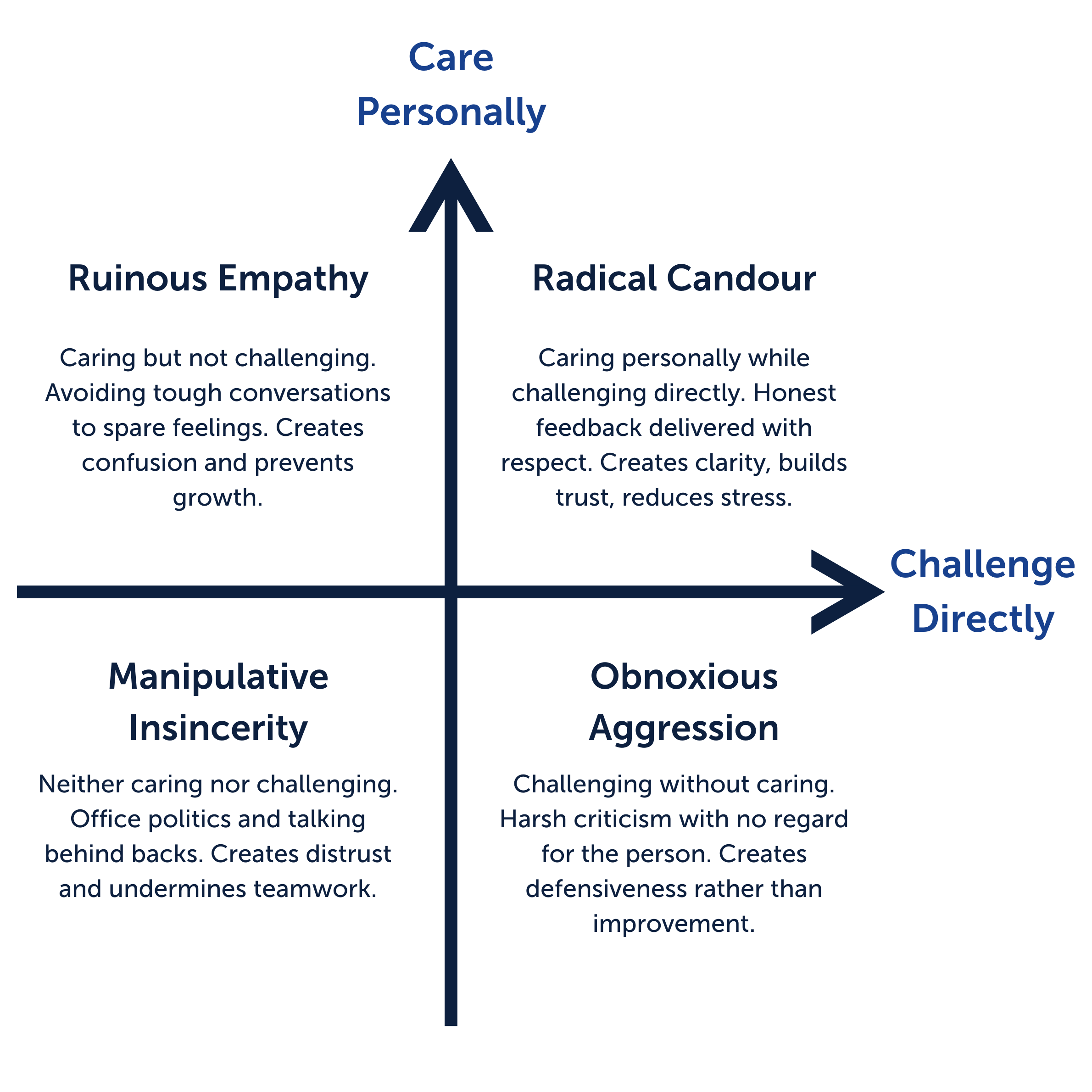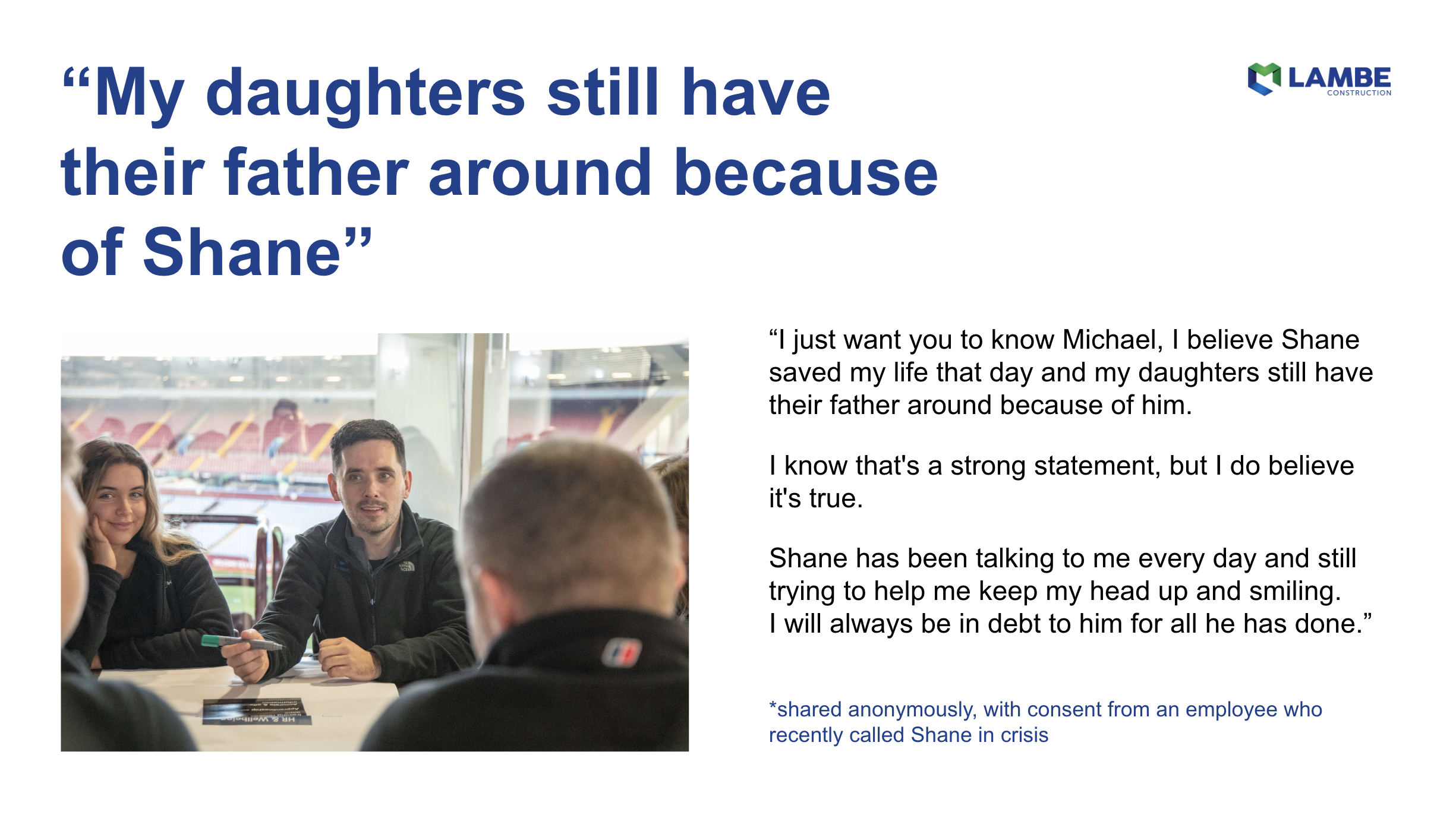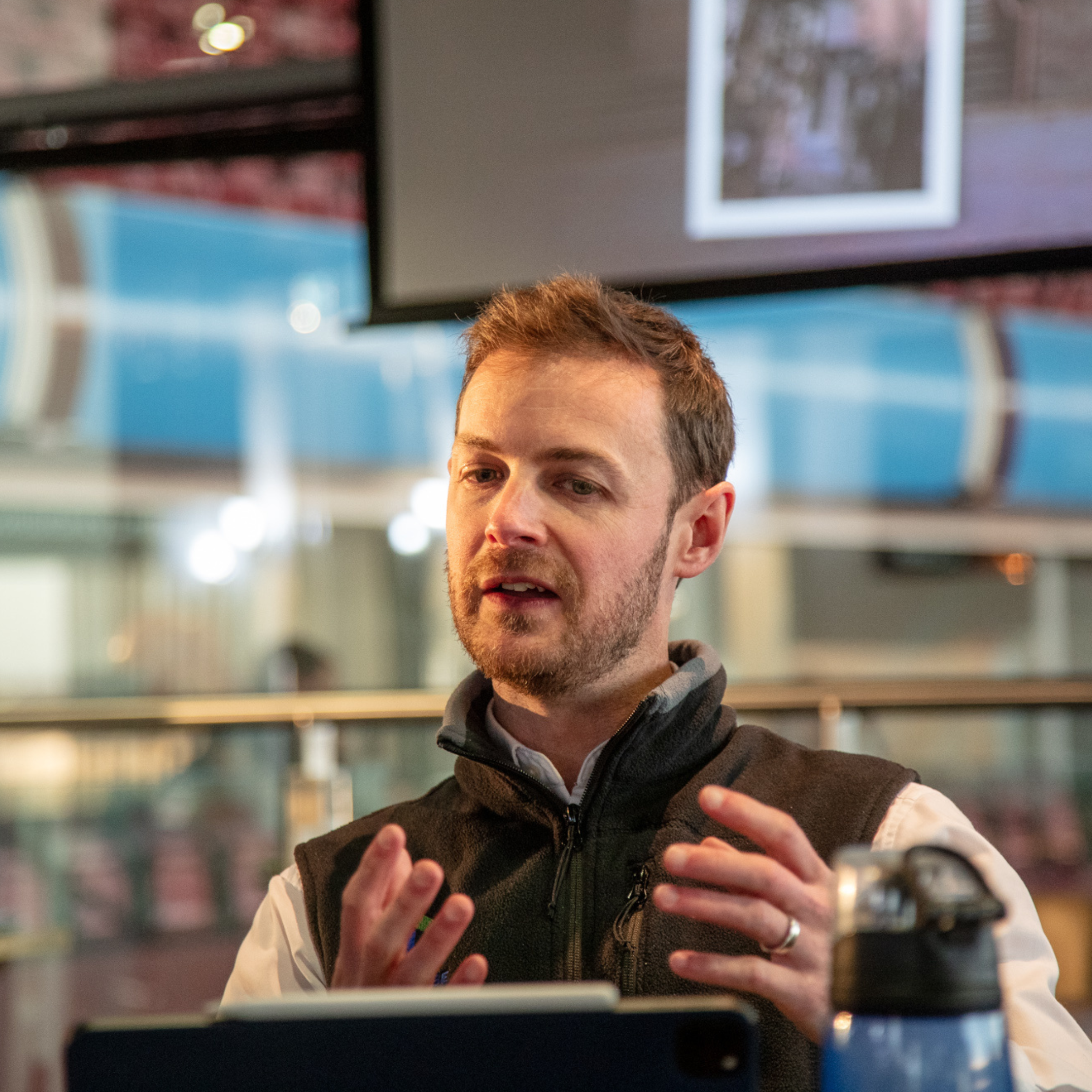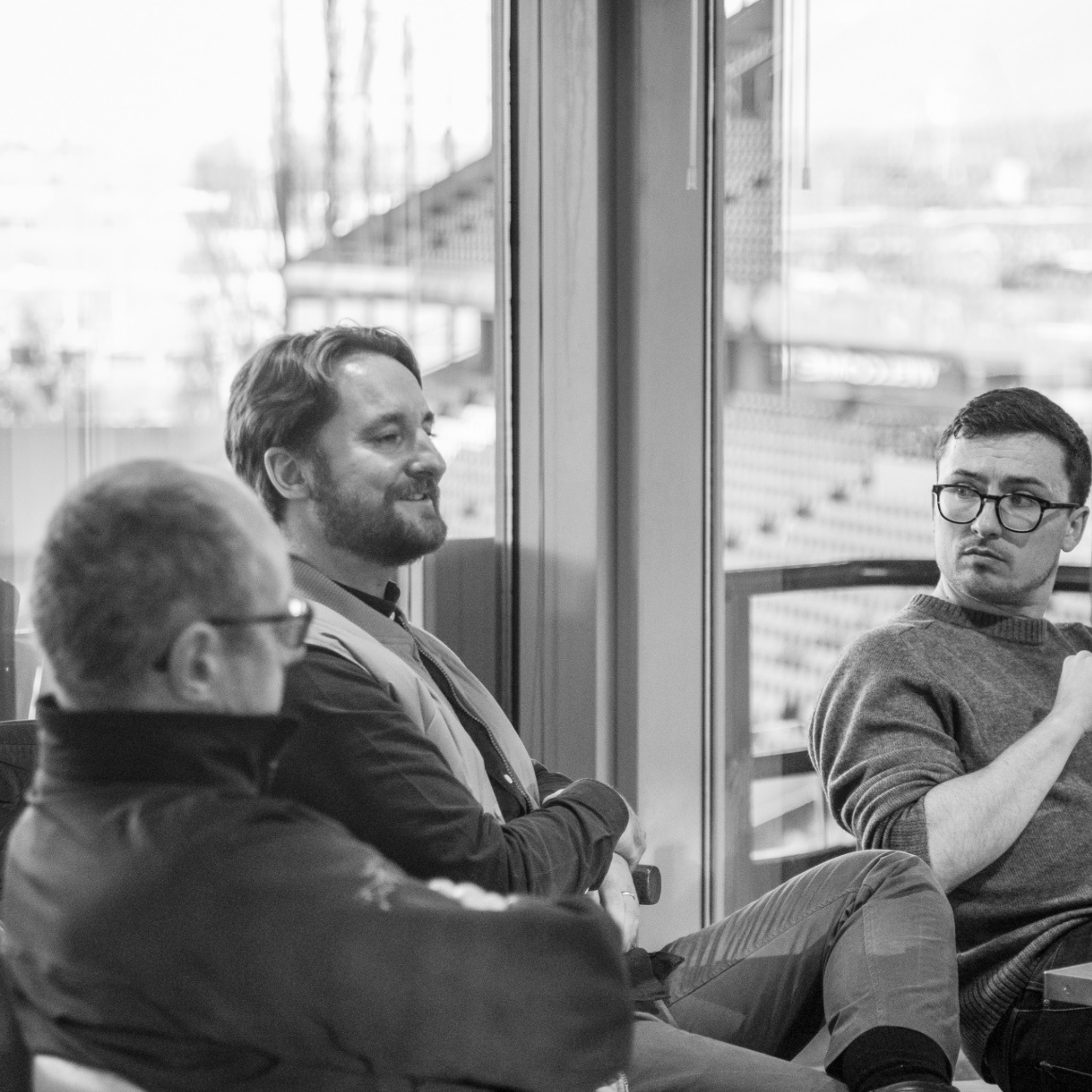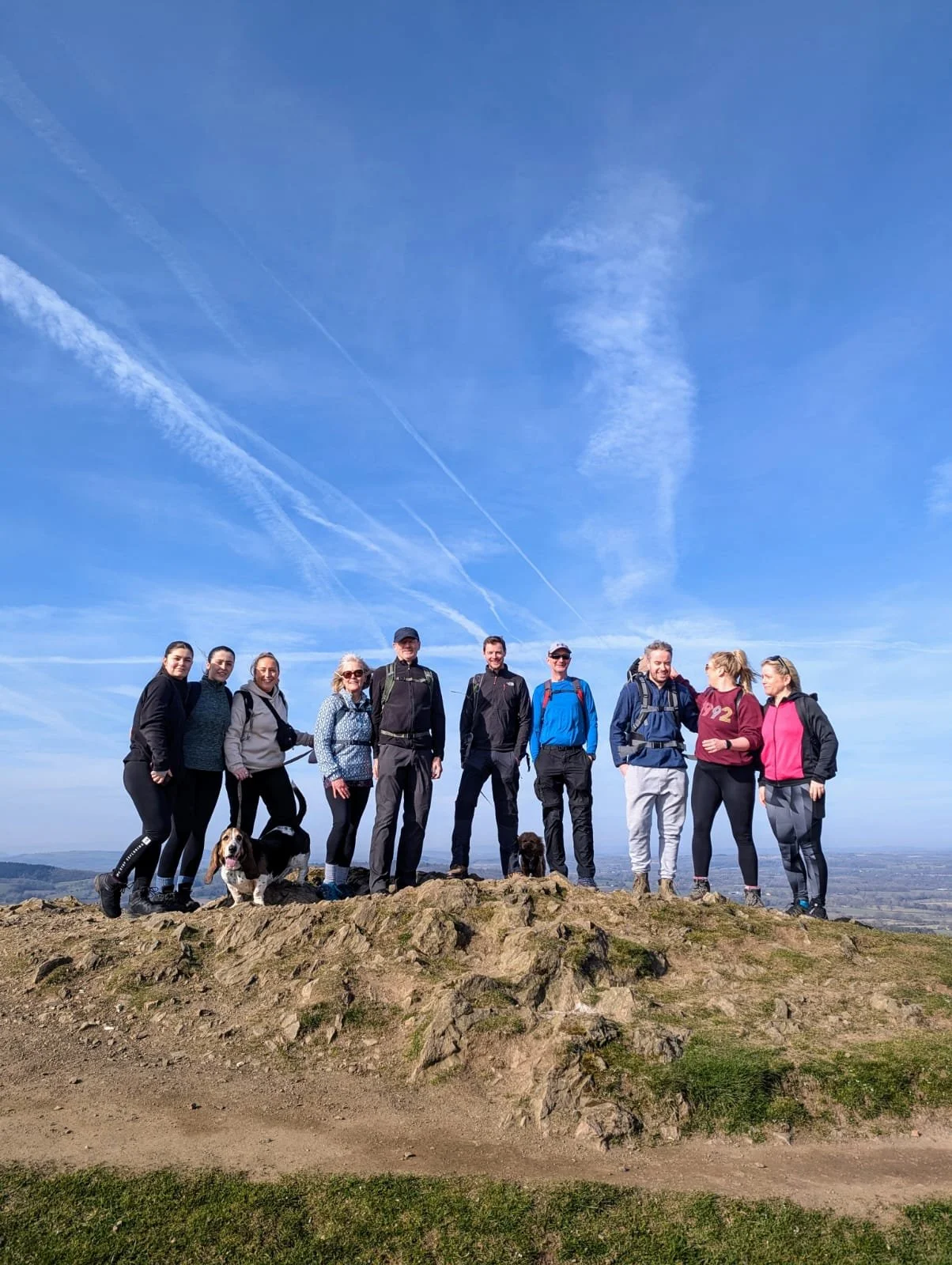7 ways to improve mental health in construction
Updated 9th October 2025 | Estimated reading time: 7 mins
Mental health in construction is one of the biggest challenges facing our industry today.
Long hours, job insecurity, and an inherited culture of toughness have left too many people struggling in silence - with suicide rates four times higher than the UK average.
For years, the answer has been posters, helplines, and hashtags.
But real change is slower. It's built on small, consistent actions rather than one-off initiatives where we all tick a box and move on.
Eight years ago, we hired Shane Kiely as the first Wellbeing Manager at a UK groundworks company. Michael Lambe, our CEO, jokes that we combined it with an HR role to get it past the raised eyebrows on the board, which says a lot about where the industry was back then.
When we lost Christy Lambe in 2022 after a long battle with his mental health, the work became deeply personal. What began as a coping strategy for grief has turned into a long-term approach that drives everything we do.
We don't have it all worked out. But if you're responsible for the wellbeing of people in construction, these seven approaches continue to make a difference for us - and they might for you too.
1. Give clear and kind feedback
You might not immediately connect a communication style developed at Google with mental health at a construction company.
But we've found that "Radical Candor" by Kim Scott - the practice of caring personally, while challenging directly - helps create a culture where:
Everyone knows where they stand
Problems get addressed before they fester
Resentment has less of a chance to build up
Here’s the framework:
“Radical Candor” Framework: Kim Scott, 2017 | www.radicalcandor.com
Image: M Lambe Construction, 2025.
As an example of radical candour in action, a few months ago, one of our newly promoted managers avoided giving honest feedback to a teammate about issues on site.
He thought he was being kind by avoiding a difficult conversation. But instead, he left his colleague feeling anxious about what was really going on.
Shane Kiely, explains: "Everyone on site processes and overthinks things throughout the day. So when someone knows something's wrong but doesn't know what, it creates far more stress than just hearing the truth."
After some coaching, the manager had the honest conversation he'd avoided. Although the team member didn't necessarily like what he heard, he was relieved to know the real problem.
“Whenever we avoid difficult conversations, we’re actually under-serving the people that work in the business.”
As Kim Scott explains in this 6-minute video, radical candour shouldn't be confused with brutal honesty. It's about saying what you mean, but with genuine care for the person you're speaking to.
It’s just as much about praise as it is about criticism.
Over and above our own anecdotal experience, research shows that giving and getting recognition can help with anxiety and depression at work.
When you create a culture that focuses on the good stuff, without ignoring the bad stuff, people feel safe speaking their mind and admitting their mistakes.
That transparency benefits the business in all sorts of ways. For example, we become more efficient, because we all learn from our mistakes faster.
2. Make it safe and easy to access support
Over the past five years, Shane has worked hard to build the trust needed for our employee assistance programme to work.
In 2024 alone, he:
Received 32 crisis calls
Facilitated 6 serious interventions
Helped 11 people receive ongoing support
One employee told us recently that he wanted others to know his story:
Slide from CN Awards presentation on our approach to wellbeing
The trust needed for someone to pick up the phone and call when they're in a genuine crisis can only be built by showing up consistently with genuine care and curiosity.
Shane's number isn't up on a poster anywhere. It’s usually shared between colleagues in the pub. That trust has taken five years to build, and the work is ongoing.
Another example is our on-site wellbeing drop-in sessions.
Instead of advertising them purely as mental health support, you can discuss anything from holiday pay and HR concerns to personal issues.
This gives people a way to access support discreetly. They can pop in for a meaningful conversation while maintaining privacy on their reason for being there.
In our first session alone, four people accessed ongoing support they wouldn't have sought otherwise.
3. Invest in skills that build resilience
In addition to our employee assistance programme, we offer employees ten free counselling sessions annually and have at least one mental health first aider on every site and office floor across our business.
These things are helpful when someone's already struggling. However, the next step is to invest in resilience training to help people avoid reaching crisis point in the first place.
Build mental resilience
We put ten people through NLP (Neuro-Linguistic Programming) practitioner training each year, giving them “practical tools” designed to help people “live by their values.”
Science suggests that helping people to identify and live by their values, is associated with lower levels of anxiety and depression.
"For some people, NLP is life-changing because they gain a new understanding of the control they can have over their thoughts and actions," Michael explains.
One team member stopped smoking on day one of the course because he finally understood why he'd started in the first place.
Build financial resilience
Many young people enter construction at 19 years old and can quickly find themselves earning more money than a GP.
But whether it's the knock-on effects of “too much” or the hardship of “not enough” – money worries are a major contributor to poor mental health.
The inherent insecurity of mainly contract-driven work adds to financial stress too, especially in a cost-of-living crisis.
It’s not rocket science, but one way we’re tackling this is to offer and actively encourage the take-up of PAYE employment to contractors who want it.
Our Finance Director, Adrian McGowan, also offers household budget reviews and personal finance training to help employees learn money management skills not taught in schools.
Adrian McGowan’s door is open to all team members for personal finance and household budget training
4. Encourage pride in the job
There's a dangerous myth in our industry that groundworkers are just rough and ready.
But beneath the often tough exterior, they're people with hopes and dreams like anyone else.
We have groundworkers on our sites who are everything from ice hockey players to portrait artists and blues musicians.
Groundworks is not often thought of as a career choice, like becoming an electrician or plumber. There's a certain "snobbery" around the role.
So raising the status of groundworks as a trade could be a key factor in addressing mental health in construction, and in groundworks specifically.
We're tackling this with a focus on professional pride, starting with a push on on-site presentation.
In construction, we often talk about quality in abstract terms, but everyone, no matter who they are, can take a step back and look at how a site makes them feel.
Is it something they're proud of?
Research shows that when people feel valued for their contribution, self-worth increases, while anxiety and depression decrease.
And of course the business case involves higher standards, attracting talent and building an industry we can all be proud of.
5. Show vulnerability as a leader
After losing Christy, Michael was open with the team about spending time speaking to somebody to help with his grief.
In construction, there's still an ingrained belief that seeking help means weakness. But when a managing director openly discusses therapy, those beliefs start to change.
“I err on the side of sharing rather than not sharing, because it feels authentic to me and shows an openness that hopefully elicits reciprocity and leads to better conversations.”
This approach has helped us to normalise mental health discussions at Lambe's.
Shane brings his own experience to his role too: "I've had poor mental health over the years. It'd be impossible to do this job without that experience."
Vulnerable leadership isn't about making it about yourself, but showing that everyone’s mental health is important, regardless of job title or pay grade.
Michael Lambe speaks openly about how therapy helps him process the grief of losing his brother, Christy.
6. Be honest about zero tolerance
The current industry approach to substances is broken.
Many construction companies have strict policies on paper, but everyone knows they're impossible to enforce fully.
Shane explains, "It's like saying to someone who's depressed, 'You're not allowed to be depressed anymore.'"
The challenge with zero tolerance policy in construction is that substances are often used as self-medication for deeper issues.
So when you push someone out of a business for failing a drug or alcohol test, all you're really doing is sending that person onto other building sites, taking all their problems with them.
A few years ago we rolled out a different policy:
If you talk to us before you fail a test, you won't lose your job
If you do fail after coming forward before testing, you need to get a clean test in your own time and at your own cost
While you're getting clean, we offer whatever support you'd like for substance issues
Once you have a clean test, you can resume your role on the same site
We all share the same labour pool, so dealing with underlying issues to help good people stay in the business is a competitive advantage.
Otherwise, the industry just pushes people around for years until they bounce back onto your doorstep anyway, because no one wants to deal with the problem.
7. Invest in community and belonging
In 2025, Mental Health Awareness Week is about 'community'. It seems obvious, but it's easily forgotten: people need people.
Research shows that when you belong to a strong community you’re likely to have better mental health. While the world's longest-running study, the Harvard Study of Adult Development, shows that the strength of our relationships is the most significant predictor of long-term happiness and health.
“Loneliness is the asbestos of the 21st century.”
We build foundations for strong communities both through our day-to-day groundworks and civil engineering work, and by funding community wellbeing.
Our support for the Christy Lambe Foundation's charity partners, Standing Tall, The Lighthouse Charity and Tabor Living, brings us together to contribute to something bigger than ourselves.
Even better under a big blue sky!
Training for the Three Peaks Challenge to fund community wellbeing through The Christy Lambe Foundation
In conclusion
There are no quick fixes for mental health in construction.
For mental health support to work, you need a culture where:
People know they won't be punished for speaking up
Leaders openly discuss their own mental health
Practical support like financial training addresses root causes
Trust builds over years and people can access support in privacy
These things take time.
Instead of ticking boxes and expecting immediate results, the industry needs to:
Invest in tackling root causes, rather than just crisis response
Train more people to have deeper conversations about mental health
Look at results over a five-year timeframe
These approaches demand commitment and patience, but the results - healthier teams, stronger businesses, and lives saved - make them worth the investment.
We hope sharing our experience will help move the conversation towards long-term solutions.
What’s working in your business? What have we missed?

